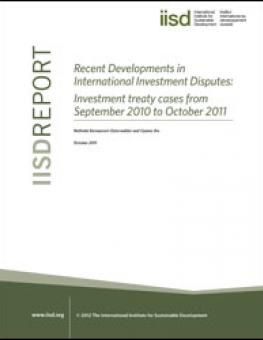
Recent Developments in International Investment Disputes: Investment treaty cases from September 2010 to October 2011
This brief was prepared for the Fifth Annual Forum of Developing Country Investment Negotiators, organized by the International Institute for Sustainable Development (IISD), the Government of Uganda and the South Centre, held in Kampala, Uganda from October 17-19, 2011.
It highlights the relevant developments in international investment disputes in an attempt to outline some of the wider policy implications of the arbitral awards between September 2010 and October 2011. Through a case analysis of some of the most significant awards on jurisdiction and liability, this brief provides an overview of the substantive issues that arose in the various arbitral awards. It outlines how tribunals have defined the term "investment" and how they have interpreted the provisions on most-favoured nation treatment, expropriation, fair and equitable treatment, and dispute resolution under investment treaties and foreign investment laws.
You might also be interested in
Why the Energy Charter Treaty Modernization Doesn't Deliver for Climate
The Energy Charter Conference adopted the "modernized" Energy Charter Treaty (ECT) on December 3, 2024. IISD's Lukas Schaugg explains what the modernization does, when it will enter into force, its tension with EU law, and why the reformed ECT can still hinder climate policies.
The Responsible Agricultural Investment Tool for Agribusiness and Case Studies
This report summarizes a collaboration to support agribusinesses in complying with principles of responsible investment in agriculture and food systems.
Stabilization Clauses: The hidden provisions that can hinder tax and investment policy reform
Stabilization clauses should no longer automatically be included in contracts between states and investors. If they are, they should, at a minimum, build on the latest international standards on stabilization to avoid being a barrier to sustainable development.
What Drives Investment Policy-makers in Developing Countries to Use Tax Incentives?
The article explores the reasons behind the use of tax incentives in developing countries to attract investment, examining the pressures, challenges, and alternative strategies that exist.